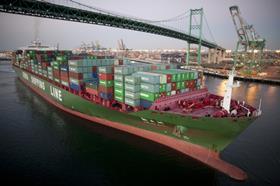
Labour action that drastically slowed cargo movement at US Pacific Northwest ports last week, has now spread to Southern California. As in Tacoma and Seattle, truckers are reportedly waiting most of the day at the ports of Los Angeles and Long Beach for release of refrigerated containers for shipping fruits and vegetables to Asian and Pacific Rim markets.
'It's as bad as I've ever seen it,' said John Ledeboer of Columbia Marketing International regarding the congestion at ports up and down the US West Coast. 'Seattle has stopped receiving containers altogether, while Tacoma is very slow although I'm hearing that some loads are getting delivered there but only after the trucker waits in line for six to eight hours' Ledeboer said that California ports are starting to experience the same kind of problems with pre-tripping containers and issuance of chassis for hauling at a stand-still.
There are reports that some Asian shipping lines are diverting vessels to the Port of Oakland in Northern California where, so far, operations remain relatively normal. The other major port on the North American west coast, Vancouver, British Columbia, is supposedly refusing to take in containers source-loaded in adjacent Washington state preferring to stay clear of the labor dispute. 'They don't want to get in the middle of all of this,' said Ledeboer.
The timing of the labor action is particularly ironic for the Washington apple industry, which is the midst of marketing its largest crop on record. Growers were gratified to finally regain access to the Chinese mainland market for the Red and Yellow Delicious varieties late last month only to see local maritime operations grind to a halt.
'(The labor dispute) is starting to impact Christmas apple shipments to the Philippines,' said one exporter who asked to speak off-record. 'And Indonesia is starting to get dicey as their quota system requires that all containers must be physically in port prior to January 1st, 2015 or they will not get off-loaded. If this thing continues another several weeks, you could potentially see Lunar New Year sales affected.'
There also reports that many US exporters are investigating shipping options out of East Coast and Gulf of Mexico ports for supplying their Central and South American holiday business.



